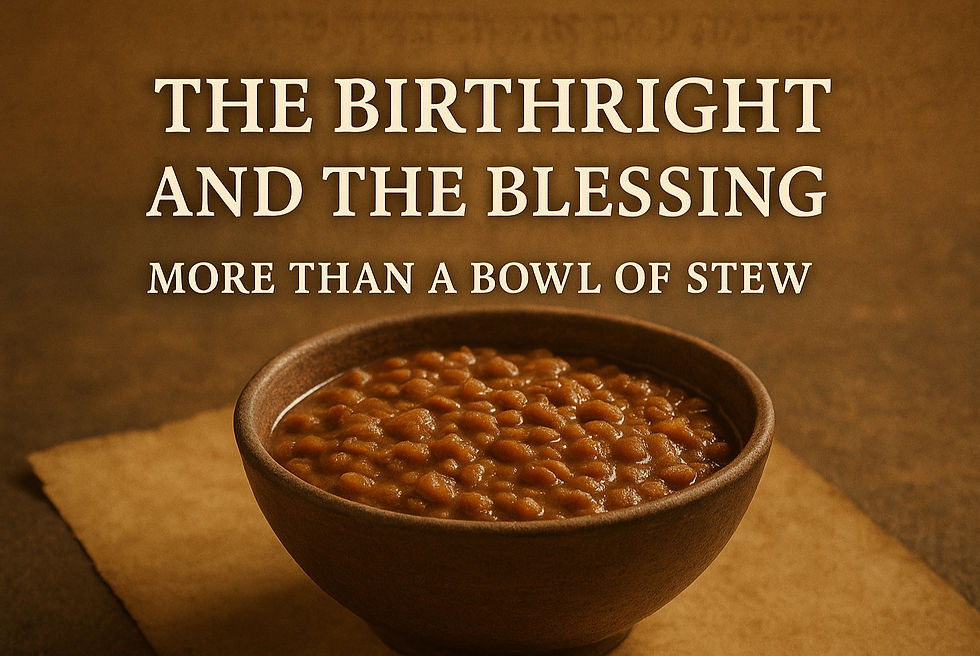The Birthright and the Blessing: More Than a Bowl of Stew
- Bible Believing Christian

- Sep 4, 2025
- 3 min read

The Birthright and the Blessing: More Than a Bowl of Stew
Few biblical stories capture the danger of undervaluing God’s promises as vividly as Esau trading his birthright for a bowl of lentil stew. The account is often reduced to a cautionary tale about impatience or bad decision-making, but Scripture presents something much deeper. The distinction between birthright and blessing is essential, as both carried spiritual weight that foreshadowed Christ. Understanding Esau’s failure is not just about stew—it is about despising covenant privilege.
Biblical Foundations: The Birthright
Genesis tells us:
“When Jacob had cooked a stew one day, Esau came in from the field and he was exhausted; and Esau said to Jacob, ‘Please let me have a mouthful of that red stuff there, for I am exhausted.’ … But Jacob said, ‘First sell me your birthright.’ Esau said, ‘Look, I am about to die; so of what use then is the birthright to me?’ And Jacob said, ‘First swear to me’; so he swore an oath to him, and sold his birthright to Jacob. Then Jacob gave Esau bread and lentil stew; and he ate and drank, and got up and went on his way. So Esau despised his birthright.” (Genesis 25:29–34, NASB)
The birthright (bekorah, בְּכֹרָה) included inheritance rights of the firstborn—double portions of property (Deuteronomy 21:17) and, more importantly, spiritual leadership in the covenant family. For Abraham’s line, the birthright meant carrying forward the promises of God: land, descendants, and the messianic blessing.
By despising his bekorah, Esau displayed contempt for the covenant itself. The stew was symbolic—he exchanged the eternal for the immediate, the sacred for the trivial.
The Blessing: Distinct Yet Connected
Later in Genesis 27, Jacob (through deception) received Isaac’s blessing (berakah, בְּרָכָה). While related to the birthright, the blessing was not identical. It was the prophetic pronouncement of covenant destiny. Isaac’s words to Jacob invoked abundance, dominion, and lordship over his brothers.
Esau realized too late the gravity of his loss:
“When Esau heard the words of his father, he cried out with an exceedingly great and bitter cry, and he said to his father, ‘Bless me—me as well, my father!’” (Genesis 27:34, NASB)
The birthright was sold; the blessing was stolen. Together, they represented the total forfeiture of Esau’s role in God’s redemptive plan.
New Testament Insights: A Warning in Hebrews
The New Testament provides commentary on Esau’s actions:
“See to it that there be no immoral or godless person like Esau, who sold his own birthright for a single meal. For you know that even afterward, when he wanted to inherit the blessing, he was rejected, for he found no place for repentance, though he sought for it with tears.” (Hebrews 12:16–17, NASB)
The Greek word translated “godless” is bebēlos (βέβηλος), meaning profane, worldly, or irreverent. Esau’s sin was not simply poor impulse control; it was contempt for sacred things. He valued the temporary satisfaction of hunger above the eternal covenant promises of God.
Theological and Historical Notes
Chrysostom highlighted Esau as an example of those who squander heavenly things for earthly gain, warning believers not to imitate his folly.
Augustine contrasted Jacob and Esau to illustrate how divine election works through God’s sovereign choice, but also how Esau’s despising of the birthright revealed his unworthiness of it.
Jewish tradition often held Esau up as the archetype of the “fleshly man,” contrasted with Jacob as the man of promise.
Misconceptions
“The stew itself was the problem.”
– No, the stew was incidental. The issue was Esau’s heart. He treated covenant inheritance as worthless.
“Esau lost everything unfairly.”
– In truth, he freely sold his birthright, and his character consistently undervalued God’s promises.
“Jacob’s deception excuses Esau.”
– While Jacob’s trickery was sinful, Esau’s contempt for the covenant was already clear. God’s sovereign choice was not based on Jacob’s merit but on His purpose.
Why This Matters
Esau’s story warns us against trading eternal blessings for temporary appetites. In every generation, people still exchange their spiritual inheritance for fleeting pleasures—money, power, comfort, or reputation. Like Esau, they treat covenant promises as trivial. Hebrews warns us not to fall into the same trap.
In Christ, we are offered an eternal inheritance: “an inheritance which is imperishable, undefiled, and will not fade away, reserved in heaven for you.” (1 Peter 1:4, NASB). To despise this gift is to repeat Esau’s folly.
Conclusion
Esau’s stew is not just an ancient family drama; it is a mirror. Every believer must ask: What am I trading for my birthright? What is my “bowl of stew”? The story reminds us that God’s promises are infinitely more valuable than fleeting desires. Christ Himself is the true inheritance, and in Him we receive the blessing that Esau despised.


